- Details
- Hits: 2280
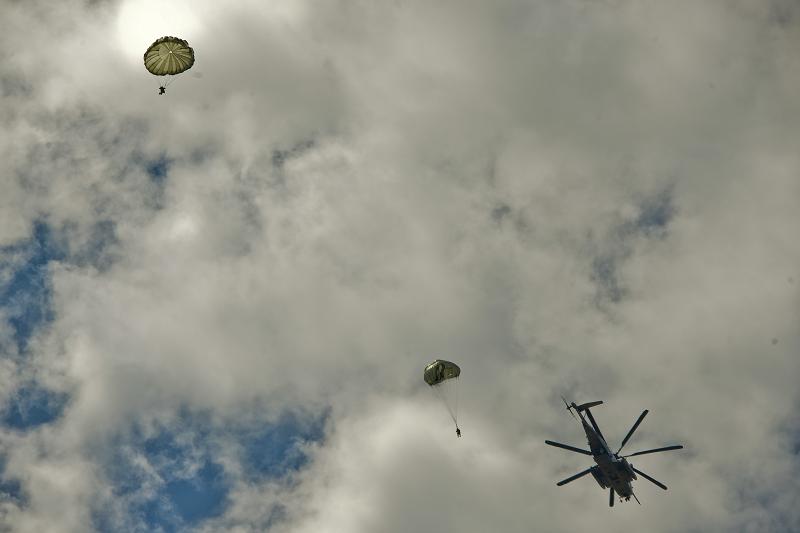 JOINT BASE MCGUIRE-DIX-LAKEHURST, N.J. – Paratroopers with 404th Civil Affairs Battalion, United States Civil Affairs & Psychological Operations Command (Airborne), jump out of a Sikorsky CH-53 Sea Stallion Helicopter during a large scale airborne operation here on Aug. 14, 2020. The unit conducted non-tactical airborne operations in order to maintain mission readiness and proficiency among their paratroopers.(U.S. Army Photo By: Sgt. 1st Class Gregory Williams, 361st Theater Public Affairs Support Element/Released)
JOINT BASE MCGUIRE-DIX-LAKEHURST, N.J. – Paratroopers with 404th Civil Affairs Battalion, United States Civil Affairs & Psychological Operations Command (Airborne), jump out of a Sikorsky CH-53 Sea Stallion Helicopter during a large scale airborne operation here on Aug. 14, 2020. The unit conducted non-tactical airborne operations in order to maintain mission readiness and proficiency among their paratroopers.(U.S. Army Photo By: Sgt. 1st Class Gregory Williams, 361st Theater Public Affairs Support Element/Released)
JOINT BASE MCGUIRE-LAKEHURST, N.J. — Over time skills can be acquired and sharpened, but if they’re not used they end up being diminished. When units go to the shooting range and hone their ability to qualify on an M4 rifle, they receive ammunition support from a range detail.
Read more: 404th Paratroopers Conduct Airborne Operations with Focus on Safety
- Details
- Hits: 3084
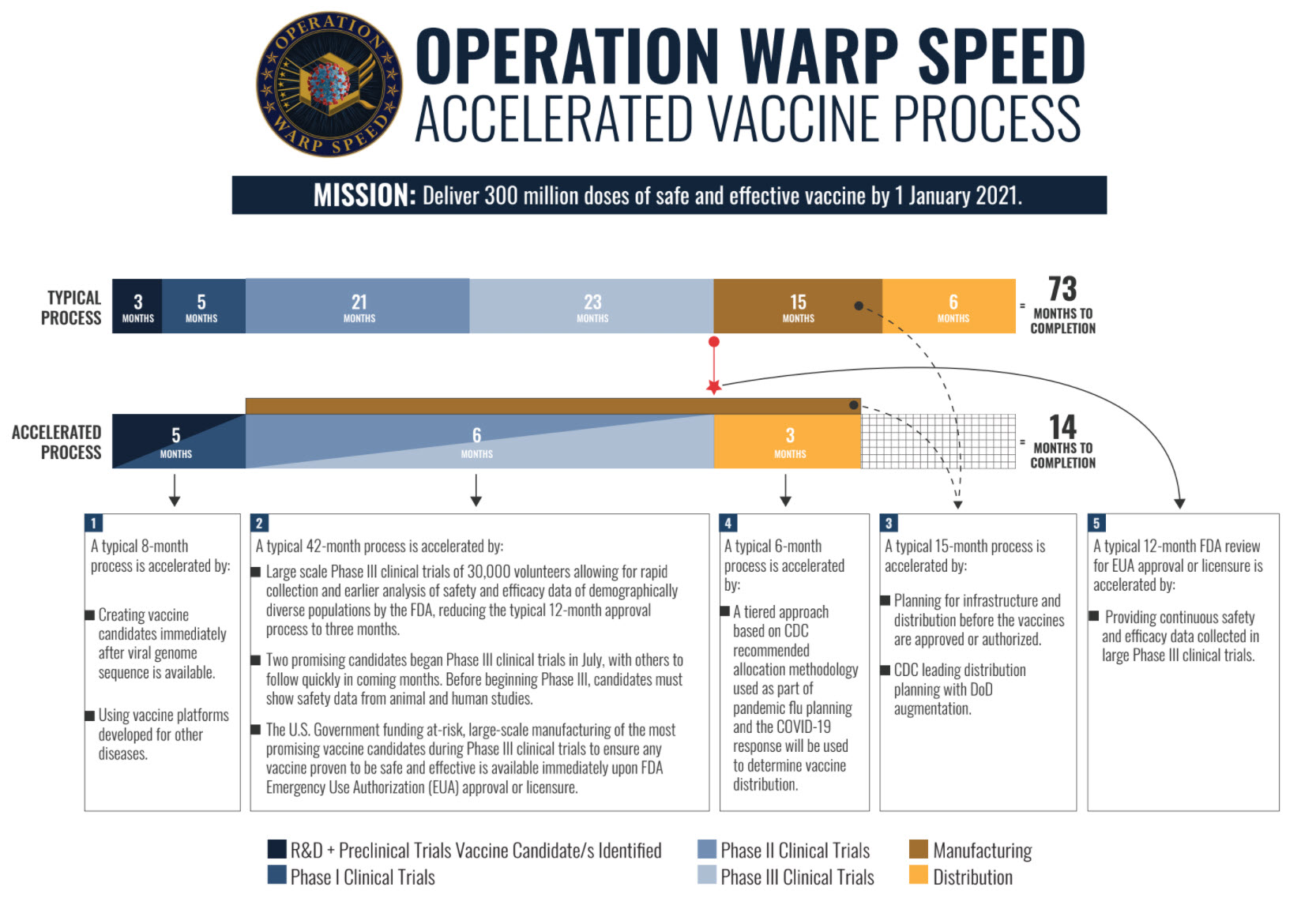
U.S., August 16,2020
On May 15, 2020 the White House announced Operation Warp Speed (OWS) to
accelerate development, production, and distribution of China Plague (COVID-19)
vaccines, therapeutics and diagnostics in order to produce 300 million safe and effective
vaccine doses available for all Americans by January 1, 2021.
- Details
- Hits: 3742
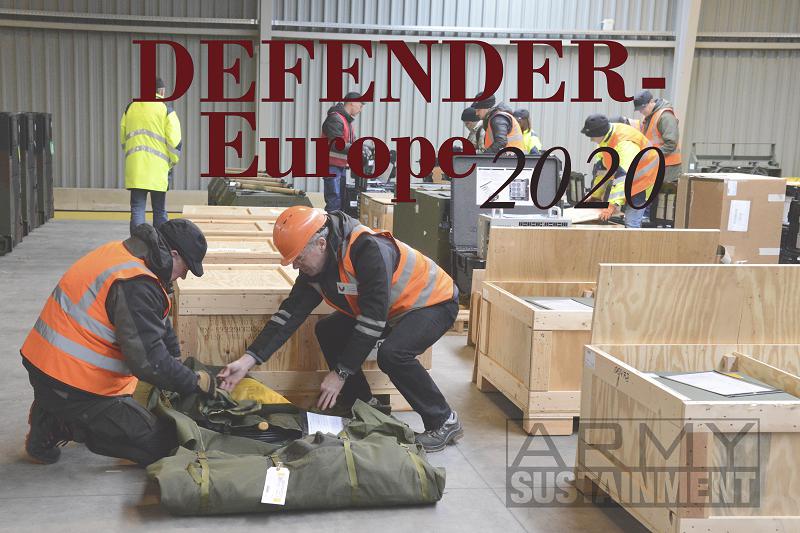 Workers with 405th Army Field Support Battalion prepare safety equipment for turn-in to 504th Composite Supply Company, 553rd Combat Sustainable Support Battalion, from Fort Hood, Texas Feb. 27, 2020, at Army Prepositioned Stock Site-2 Zutendaal. The 504th CSC deployed to Poland in support of DEFENDER-Europe 20. (photo by Henri Cambier)
Workers with 405th Army Field Support Battalion prepare safety equipment for turn-in to 504th Composite Supply Company, 553rd Combat Sustainable Support Battalion, from Fort Hood, Texas Feb. 27, 2020, at Army Prepositioned Stock Site-2 Zutendaal. The 504th CSC deployed to Poland in support of DEFENDER-Europe 20. (photo by Henri Cambier)
A key objective for the inaugural DEFENDER-Europe 2020 exercise (DEF-EUR 20) was the issue, use, and turn-in of Army prepositioned stock (APS) equipment as part of exercising dynamic force employment of a combat-credible force. In this capacity, Europe-based APS-2 builds rapid power projection in theater and operationalizes the U.S. National Defense Strategy. Army Doctrine Publication 4-0, Sustainment, makes clear the value of geographically dispersed APS sites: they are essential to timely support to national military and defense strategies in areas of national interest and treaty obligations, while significantly reducing strategic lift requirements and bypassing congested nodes.
- Details
- Hits: 1846
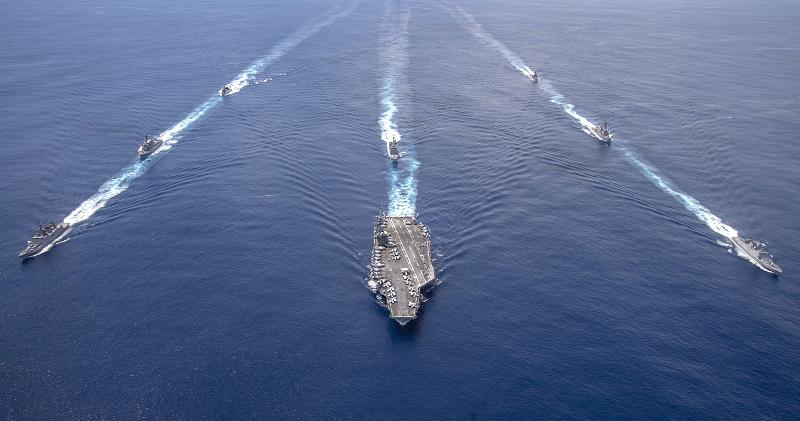 200720-N-MY642-0207INDIAN OCEAN (July 20, 2020) The Nimitz Carrier Strike Group, consisting of flagship USS Nimitz (CVN 68), Ticonderoga-class guided missile cruiser USS Princeton (CG 59) and Arleigh Burke-class guided missile destroyers USS Sterett (DDG 104) and USS Ralph Johnson (DDG 114), along with Indian Navy ships Rana, Sahyadri, Shivalik and Kamorta, steam in formation during a cooperative deployment in the Indian Ocean July 20. (U.S. Navy photo by Mass Communication Specialist 2nd Class Donald R. White, Jr.)
200720-N-MY642-0207INDIAN OCEAN (July 20, 2020) The Nimitz Carrier Strike Group, consisting of flagship USS Nimitz (CVN 68), Ticonderoga-class guided missile cruiser USS Princeton (CG 59) and Arleigh Burke-class guided missile destroyers USS Sterett (DDG 104) and USS Ralph Johnson (DDG 114), along with Indian Navy ships Rana, Sahyadri, Shivalik and Kamorta, steam in formation during a cooperative deployment in the Indian Ocean July 20. (U.S. Navy photo by Mass Communication Specialist 2nd Class Donald R. White, Jr.)
INDIAN OCEAN (NNS) July 20, 2020 -- The Nimitz Carrier Strike Group, consisting of flagship USS Nimitz (CVN 68), Ticonderoga-class guided missile cruiser USS Princeton (CG 59) and Arleigh Burke-class guided missile destroyers USS Sterett (DDG 104) and USS Ralph Johnson (DDG 114), participated in cooperative exercises with the Indian Navy in the Indian Ocean commencing July 20."It was a privilege to operate with the Indian Navy,” said Rear Adm. Jim Kirk, commander, Nimitz Carrier Strike Group. “RADM Vatsayan, Flag Officer Commanding Eastern Fleet, leads a powerful and highly skilled Fleet. The opportunity to have the Nimitz Carrier Strike Group join with his Fleet for a series of exercises improved our interoperability and is a testimony to the flexibility of both our Navies."While operating together, the U.S. and Indian naval forces conducted high-end exercises designed to maximize training and interoperability, including air defense. Nimitz CSG’s operations are designed to provide security throughout the region while building partnerships with friends and allies.Naval engagements such as these exercises improve the cooperation of U.S. and Indian maritime forces and contribute to both sides' ability to counter threats at sea, from piracy to violent extremism. These engagements also present opportunities to build upon the pre-existing strong relationship between the United States and India and allow both countries to learn from each other.Nimitz Carrier Strike Group is currently deployed to the Indian Ocean in support of a free and open Indo-Pacific.
By Carrier Strike Group 11 PAO
Distributed by permission of DOW .
- Details
- Hits: 1609
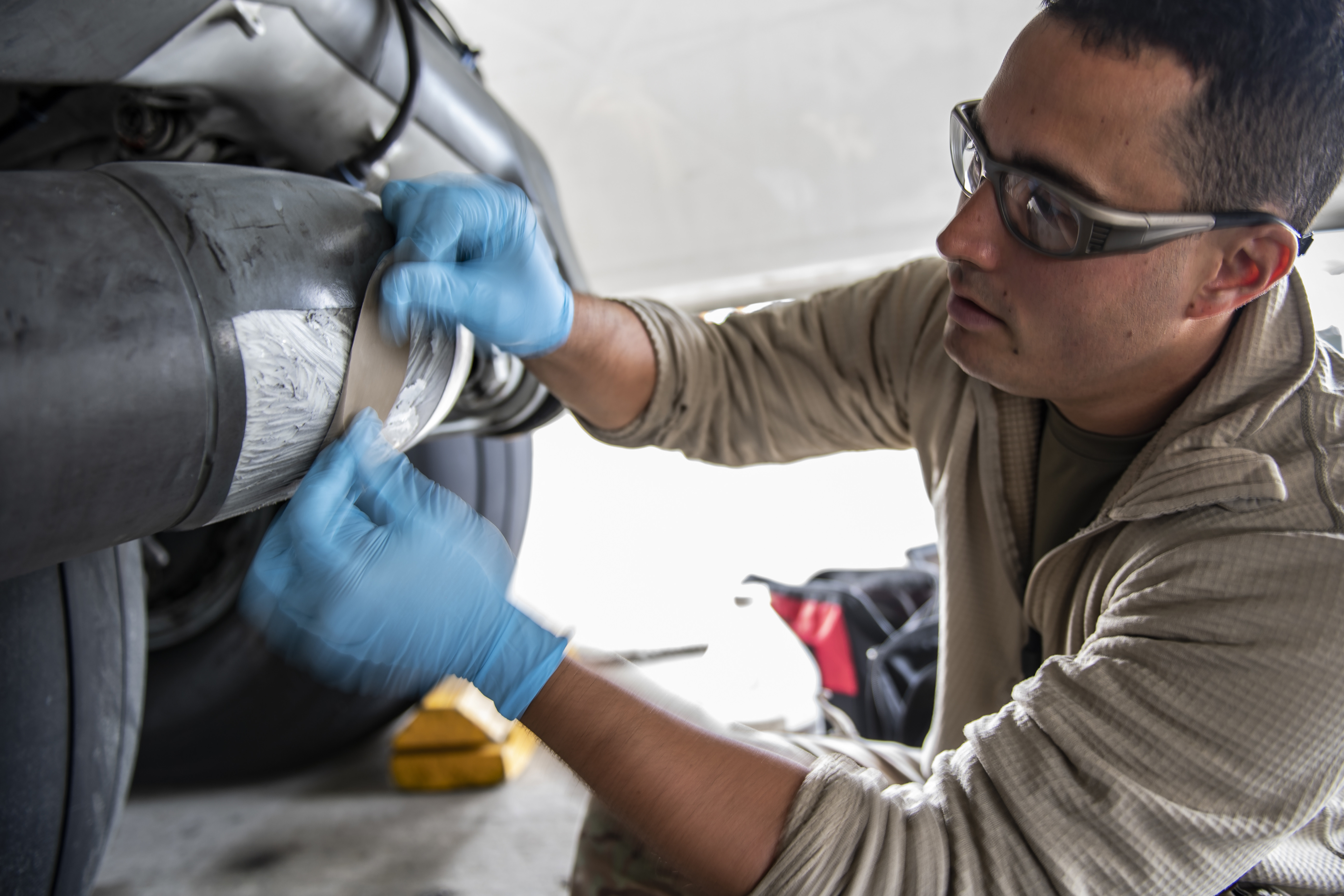 Staff Sgt. James Krobot, 911th Maintenance Squadron aircraft structural maintenance technician, sands down anti-chafing tape on a C-17 Globemaster III main landing gear assembly during a home station check inspection at the Pittsburgh International Airport Air Reserve Station, Pennsylvania, May 18, 2020. Airmen are performing the first ever HSC in Pittsburgh on the flightline due to the travel restrictions in place because of COVID-19 while the new hangar is still under contruction. (photo by Joshua J. Seybert)
Staff Sgt. James Krobot, 911th Maintenance Squadron aircraft structural maintenance technician, sands down anti-chafing tape on a C-17 Globemaster III main landing gear assembly during a home station check inspection at the Pittsburgh International Airport Air Reserve Station, Pennsylvania, May 18, 2020. Airmen are performing the first ever HSC in Pittsburgh on the flightline due to the travel restrictions in place because of COVID-19 while the new hangar is still under contruction. (photo by Joshua J. Seybert)
One of the biggest lessons learned during the COVID-19 pandemic is that the supply chain is vulnerable to offshore suppliers, particularly adversaries such as China, a senior Pentagon official said.
Read more: Pandemic Revealed Supply Chain Vulnerability, Pentagon Official Says
- Details
- Hits: 1835
The Fourth of July celebrates our independence, which was secured for us by our soldiers in the Continental Army, and protected by our Armed Forces ever since. We have asked them to defend it from Fascist, Marxist, and Communist aggression. Are we good stewards of their sacrifices? Do we keep our national house in proper order? Or are we to be infiltrated and destroyed from within while they are deployed protecting us? How might that happen? Watch and learn.
Video Rights. Creative Commons license: Public Domain.


